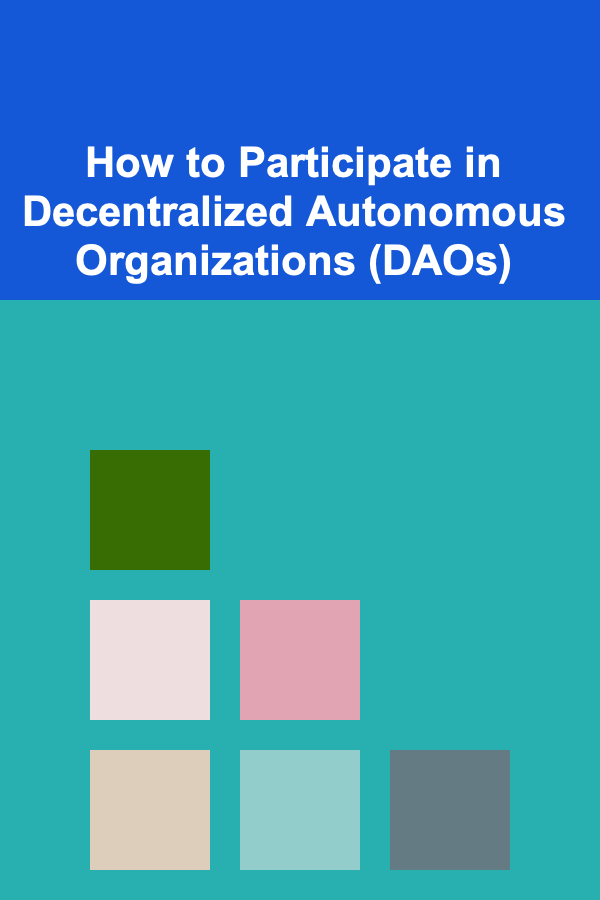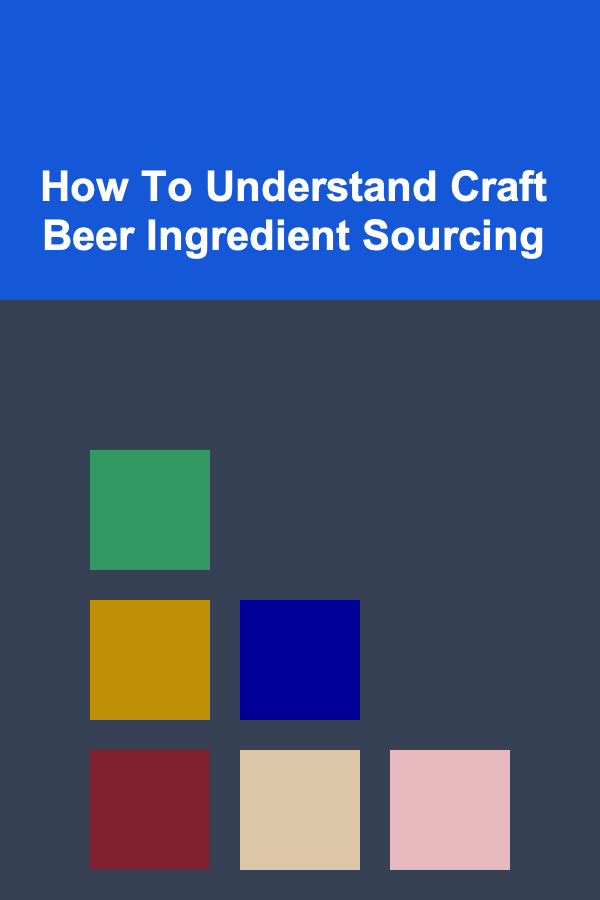
How to Participate in Decentralized Autonomous Organizations (DAOs)
ebook include PDF & Audio bundle (Micro Guide)
$12.99$10.99
Limited Time Offer! Order within the next:

Decentralized Autonomous Organizations (DAOs) represent a paradigm shift in organizational structure, moving away from traditional hierarchical models towards more democratic and community-driven governance. They leverage blockchain technology to create transparent, automated, and resilient organizations, enabling individuals from around the world to collaborate and contribute to shared goals. Participating in DAOs offers a unique opportunity to shape the future of these organizations and the broader decentralized landscape. This article provides an in-depth guide on how to effectively participate in DAOs, covering various aspects from understanding the basics to making meaningful contributions.
Understanding the Foundations of DAOs
Before diving into participation, it's crucial to understand the underlying principles and components of DAOs. At its core, a DAO is an internet-native organization collectively owned and managed by its members through rules encoded in smart contracts. These smart contracts, deployed on a blockchain, automatically execute decisions based on predefined conditions, ensuring transparency and immutability. Key components include:
- Smart Contracts: The fundamental building blocks of a DAO, defining its rules, governance mechanisms, and tokenomics. These contracts are self-executing and tamper-proof, ensuring that decisions are carried out according to the established code.
- Tokens: DAOs often utilize tokens for governance and economic incentives. Governance tokens grant voting rights, allowing holders to participate in decision-making processes. Utility tokens can be used within the DAO's ecosystem for various purposes, such as accessing services or earning rewards.
- Community: The heart of any DAO, comprised of individuals who contribute their skills, knowledge, and resources to achieve the organization's objectives. Active community participation is essential for the DAO's success and long-term sustainability.
- Treasury: DAOs typically manage a treasury of digital assets, which are used to fund projects, compensate contributors, and incentivize participation. The treasury is governed by the rules encoded in the smart contracts, ensuring transparency and accountability.
- Proposals: The mechanism by which changes are suggested, debated, and ultimately voted upon within the DAO. Proposals can range from minor adjustments to major strategic decisions.
- Voting: The process by which token holders exercise their voting rights to approve or reject proposals. Different DAOs employ different voting mechanisms, such as quadratic voting, token-weighted voting, and conviction voting.
Finding the Right DAO for You
The DAO landscape is diverse, with organizations focused on various sectors and goals. Choosing a DAO that aligns with your interests, skills, and values is crucial for effective participation. Consider the following factors when selecting a DAO:
- Mission and Vision: Understand the DAO's overall objectives and ensure they resonate with your personal beliefs and interests. Are you passionate about the problem the DAO is trying to solve? Do you believe in its vision for the future?
- Industry or Niche: DAOs operate in various sectors, including DeFi, NFTs, gaming, social impact, and more. Select a DAO within an area where you have relevant expertise or a strong interest.
- Community Culture: Explore the DAO's community forums, Discord channels, and other communication platforms to gauge the culture and level of engagement. A supportive and inclusive community is essential for a positive participation experience. Look for signs of active discussion, helpfulness, and respect.
- Governance Structure: Examine the DAO's governance mechanisms, including the voting process, proposal submission guidelines, and tokenomics. Ensure you understand how decisions are made and how you can influence the organization's direction. Is the process transparent and fair?
- Reputation and Track Record: Research the DAO's history, achievements, and any controversies it may have faced. A reputable DAO with a proven track record is more likely to be successful and sustainable.
- Required Skills: Some DAOs require specific skills, such as software development, marketing, design, or community management. Assess your skills and identify DAOs where you can contribute effectively.
Platforms like DeepDAO, DAOhaus, and Snapshot provide directories and information about various DAOs, allowing you to compare their metrics, governance structures, and activities.
Getting Involved: First Steps
Once you've identified a DAO you're interested in, take the following steps to get involved:
- Join the Community: The first step is to join the DAO's online community channels, such as Discord, Telegram, or forums. Introduce yourself, listen to discussions, and start building relationships with other members.
- Read the Documentation: Familiarize yourself with the DAO's documentation, including its whitepaper, governance guidelines, and contribution processes. Understanding the DAO's rules and objectives is crucial for effective participation.
- Obtain Governance Tokens: Acquire the DAO's governance tokens, which grant you voting rights and influence over decision-making. You can typically purchase tokens on decentralized exchanges (DEXs) or earn them by contributing to the DAO.
- Attend Community Calls: Participate in community calls, which are regular meetings where members discuss important topics, propose ideas, and make decisions. These calls are a great way to stay informed and contribute your voice.
- Introduce Yourself and Your Skills: Actively participate in community discussions and share your skills and interests. Let other members know how you can contribute to the DAO's objectives.
Contributing to the DAO
Participation in a DAO goes beyond simply holding tokens and voting on proposals. Active contribution is essential for the DAO's growth and success. Here are several ways you can contribute:
- Development: If you have software development skills, you can contribute to the DAO's codebase, build new features, and fix bugs. This is particularly valuable for DAOs building decentralized applications or protocols.
- Design: Designers can contribute by creating visual assets, improving the user interface (UI), and enhancing the user experience (UX) of the DAO's products and platforms.
- Marketing and Communications: Marketing professionals can help promote the DAO, attract new members, and build brand awareness. This includes creating content, managing social media, and organizing events.
- Community Management: Community managers play a crucial role in fostering a positive and engaged community. They moderate discussions, answer questions, and organize events to build relationships between members.
- Content Creation: Create valuable content, such as blog posts, articles, videos, and tutorials, to educate others about the DAO and its mission.
- Research and Analysis: Conduct research and analysis on relevant topics, such as market trends, competitor analysis, and governance best practices. This information can help the DAO make informed decisions.
- Governance Participation: Actively participate in governance discussions, submit proposals, and vote on important decisions. Your voice matters and can help shape the DAO's future.
- Grant Writing: Many DAOs fund projects through grants. Help the DAO or individuals within the DAO write compelling grant proposals to secure funding for important initiatives.
- Translation: Help translate DAO materials (documentation, website, etc.) into other languages to broaden the reach and inclusivity of the DAO.
Many DAOs utilize platforms like Coordinape or SourceCred to track and reward contributions. These platforms allow members to recognize and appreciate each other's efforts, fostering a culture of collaboration and appreciation.
Navigating DAO Governance and Proposals
Understanding the governance processes within a DAO is critical for effective participation. Here's a breakdown of the key aspects:
- Proposal Submission: Familiarize yourself with the DAO's proposal submission guidelines. Typically, you'll need to draft a proposal outlining the problem, proposed solution, and expected benefits. Be sure to include relevant data and evidence to support your proposal.
- Community Discussion: Once a proposal is submitted, it's typically open for community discussion. Actively participate in these discussions, provide feedback, and address any concerns raised by other members. Be respectful and open to different perspectives.
- Voting Process: Understand the DAO's voting mechanism, such as token-weighted voting, quadratic voting, or conviction voting. Cast your vote thoughtfully, considering the potential impact of the proposal on the DAO. Be sure to understand the voting period and quorum requirements.
- Review and Implementation: If a proposal is approved, the DAO will typically implement the changes. Follow up on the implementation progress and provide feedback as needed.
Different DAOs employ various governance models. Some common models include:
- Token-Weighted Voting: Each token holder's voting power is proportional to the number of tokens they hold.
- Quadratic Voting: Allows voters to allocate their voting power across multiple proposals, giving more weight to their preferred options. It can mitigate the influence of large token holders.
- Conviction Voting: Members stake tokens on proposals they support, and the "conviction" (or weight) of their vote increases over time. This encourages long-term commitment and discourages impulsive decisions.
- Delegated Voting: Token holders can delegate their voting rights to other members who have relevant expertise or experience. This allows for more informed decision-making.
Earning Rewards and Incentives
Many DAOs offer rewards and incentives to encourage participation and contributions. These can include:
- Token Rewards: Earning governance or utility tokens for completing tasks, contributing to projects, or participating in community activities.
- Bounties: Completing specific tasks or projects in exchange for a predetermined reward.
- Grants: Receiving funding to develop new projects or initiatives that benefit the DAO.
- Reputation Systems: Earning reputation points or badges for positive contributions, which can unlock additional benefits and opportunities.
- Profit Sharing: Sharing in the profits generated by the DAO's activities.
Be sure to understand the DAO's reward system and how you can earn incentives for your contributions. This can be a great way to earn income while contributing to a meaningful project.
Tools and Resources for DAO Participation
Several tools and resources can help you navigate the DAO landscape and participate effectively:
- DeepDAO: A platform for tracking and analyzing DAOs, providing information on their metrics, governance structures, and activities.
- DAOhaus: A platform for creating and managing DAOs on the Ethereum blockchain.
- Snapshot: A decentralized voting platform that allows DAOs to conduct off-chain voting using on-chain token balances.
- Discord and Telegram: Popular communication platforms used by DAOs for community discussions and announcements.
- Coordinape: A tool for tracking and rewarding contributions within DAOs.
- SourceCred: A tool for measuring and rewarding contributions based on their impact on the DAO.
- Trello or Jira: Project management tools used by DAOs to organize tasks and track progress.
- GitHub: A platform for code collaboration and version control, used by DAOs for software development.
Potential Challenges and How to Overcome Them
Participating in DAOs can present some challenges. Here are some common issues and how to address them:
- Lack of Clarity: DAOs can sometimes be complex and difficult to understand. Take the time to read the documentation, ask questions, and connect with other members to gain a better understanding.
- Information Overload: DAOs can generate a large volume of information, making it difficult to stay informed. Prioritize the most important channels and discussions, and use tools like Discord bots to filter information.
- Governance Fatigue: Participating in governance discussions and voting can be time-consuming. Focus on the proposals that are most important to you, and delegate your voting rights if needed.
- Sybil Attacks: One entity accumulating a large number of tokens or identities to disproportionately influence voting outcomes. DAOs employ different strategies to mitigate Sybil attacks, such as requiring proof of personhood or using weighted voting systems.
- Security Risks: Smart contracts are susceptible to bugs and vulnerabilities. It is crucial to only participate in DAOs that have undergone thorough audits and have robust security practices.
- Coordination Challenges: Coordination among distributed members can be challenging. Utilize project management tools, communication platforms, and regular meetings to improve coordination.
- Legal and Regulatory Uncertainty: The legal and regulatory landscape for DAOs is still evolving. Stay informed about the latest developments and consult with legal professionals as needed.
The Future of DAO Participation
DAO participation is poised to become increasingly mainstream as the technology matures and the benefits become more widely recognized. Future trends include:
- Improved Tooling: More user-friendly tools and platforms will make it easier for individuals to participate in DAOs.
- Increased Decentralization: DAOs will become more decentralized, with greater autonomy and control for their members.
- More Diverse Use Cases: DAOs will be used for a wider range of purposes, from managing communities to funding scientific research.
- Integration with Traditional Organizations: DAOs may increasingly integrate with traditional organizations, creating hybrid models that combine the benefits of both.
- Sophisticated Governance Mechanisms: Advancements in voting mechanisms, such as liquid democracy and futarchy, will improve the efficiency and effectiveness of DAO governance.
Conclusion
Participating in DAOs offers a unique opportunity to contribute to the future of decentralized governance and shape the direction of innovative projects. By understanding the fundamentals of DAOs, finding the right DAO for your skills and interests, and actively contributing to the community, you can play a meaningful role in these emerging organizations. While challenges exist, the potential rewards are significant, both in terms of personal growth and the opportunity to build a more transparent, democratic, and equitable future. Embrace the decentralized revolution and start exploring the exciting world of DAO participation today!

Expert Advice for Pet Care on a Budget: Keeping Your Pet Happy and Healthy
Read More
How to Delegate Product Research Tasks to a Virtual Assistant in Your Dropshipping Business
Read More
How to Invest in Stocks for Beginners
Read More
How to Use Mirrors to Make Your Home Look Larger
Read More
How To Understand Craft Beer Ingredient Sourcing
Read More
How to Track Interview Expenses for Tax Deductions
Read MoreOther Products

Expert Advice for Pet Care on a Budget: Keeping Your Pet Happy and Healthy
Read More
How to Delegate Product Research Tasks to a Virtual Assistant in Your Dropshipping Business
Read More
How to Invest in Stocks for Beginners
Read More
How to Use Mirrors to Make Your Home Look Larger
Read More
How To Understand Craft Beer Ingredient Sourcing
Read More